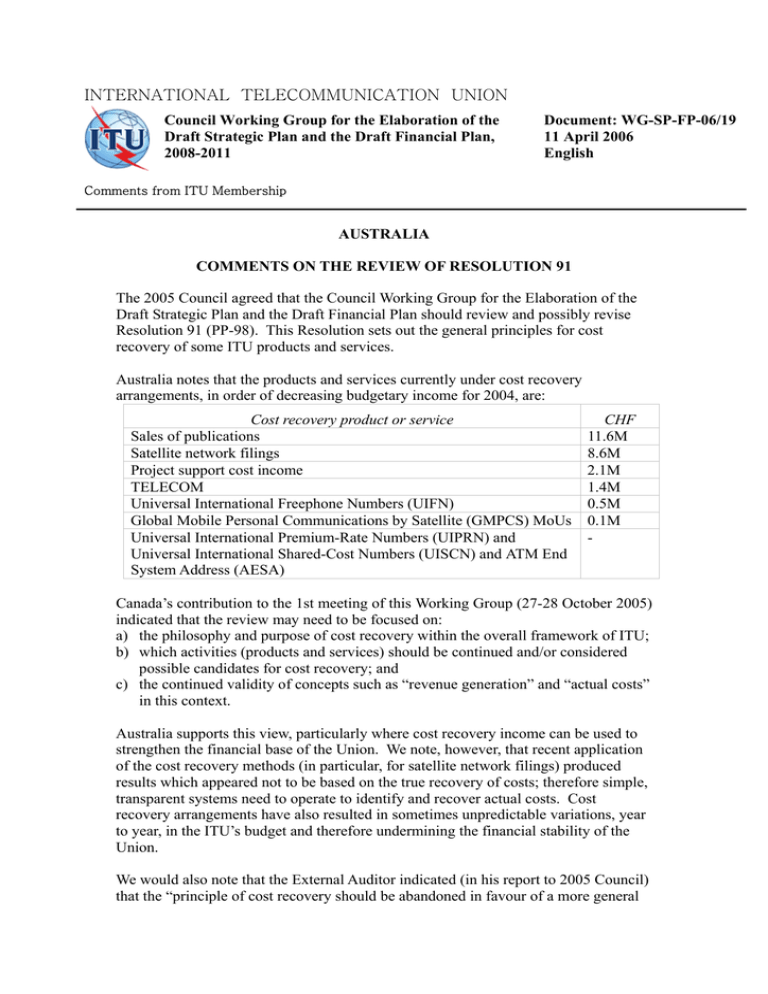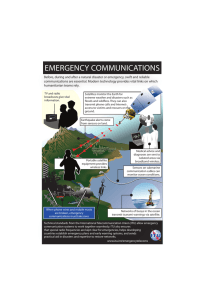INTERNATIONAL TELECOMMUNICATION UNION
advertisement

INTERNATIONAL TELECOMMUNICATION UNION Council Working Group for the Elaboration of the Draft Strategic Plan and the Draft Financial Plan, 2008-2011 Document: WG-SP-FP-06/19 11 April 2006 English Comments from ITU Membership AUSTRALIA COMMENTS ON THE REVIEW OF RESOLUTION 91 The 2005 Council agreed that the Council Working Group for the Elaboration of the Draft Strategic Plan and the Draft Financial Plan should review and possibly revise Resolution 91 (PP-98). This Resolution sets out the general principles for cost recovery of some ITU products and services. Australia notes that the products and services currently under cost recovery arrangements, in order of decreasing budgetary income for 2004, are: Cost recovery product or service Sales of publications Satellite network filings Project support cost income TELECOM Universal International Freephone Numbers (UIFN) Global Mobile Personal Communications by Satellite (GMPCS) MoUs Universal International Premium-Rate Numbers (UIPRN) and Universal International Shared-Cost Numbers (UISCN) and ATM End System Address (AESA) CHF 11.6M 8.6M 2.1M 1.4M 0.5M 0.1M - Canada’s contribution to the 1st meeting of this Working Group (27-28 October 2005) indicated that the review may need to be focused on: a) the philosophy and purpose of cost recovery within the overall framework of ITU; b) which activities (products and services) should be continued and/or considered possible candidates for cost recovery; and c) the continued validity of concepts such as “revenue generation” and “actual costs” in this context. Australia supports this view, particularly where cost recovery income can be used to strengthen the financial base of the Union. We note, however, that recent application of the cost recovery methods (in particular, for satellite network filings) produced results which appeared not to be based on the true recovery of costs; therefore simple, transparent systems need to operate to identify and recover actual costs. Cost recovery arrangements have also resulted in sometimes unpredictable variations, year to year, in the ITU’s budget and therefore undermining the financial stability of the Union. We would also note that the External Auditor indicated (in his report to 2005 Council) that the “principle of cost recovery should be abandoned in favour of a more general 2 principle that costs should be covered, with the mid to long-term objective of balancing revenue and expenditure for the activity, while accepting deficits or surpluses from one biennium to the next”. In reviewing Resolution 91, Australia believes that the Council Working may wish to clarify some of the existing principles, as well as to consider some additional principles, in applying cost recovery to ITU products and services. These may include that: • Charges under cost recovery arrangements should reflect actual costs within the Results-Based Budgeting (RBB) framework. • Recovery of costs should not necessarily include the fully distributed costs of the ITU administration and management because the ITU is structured principally on “member service lines” and not “commercial lines”. • The RBB framework and cost-allocation methodology should be used to improve the forecasting of cost recovery income. • The cost recovery principles should not support the idea of ‘uncollectible’ invoices for work that has already been completed or provided (it may be appropriate for upfront fees to be charged or part payments to be made to reduce the possibility of ‘uncollectible’ invoices). • Accountability arrangements should be introduced, for example major anomalies in charges applied should be identified and be redressed on application by the user. • Cost recovery processes should be benchmarked where appropriate. • Where a product or service is identified as appropriate for delivery under a cost recovery arrangement, consideration should be given to market testing, outsourcing or accrediting external providers to deliver the product or service. Australia is willing to work with other Member States to amend Resolution 91 to reflect these principles and others that are deemed appropriate. For example, we note that it may be appropriate to amend Resolution 91 to explicitly refer to the new costallocation methodology adopted by Council 2005 and contained in Decision 535. _____________

